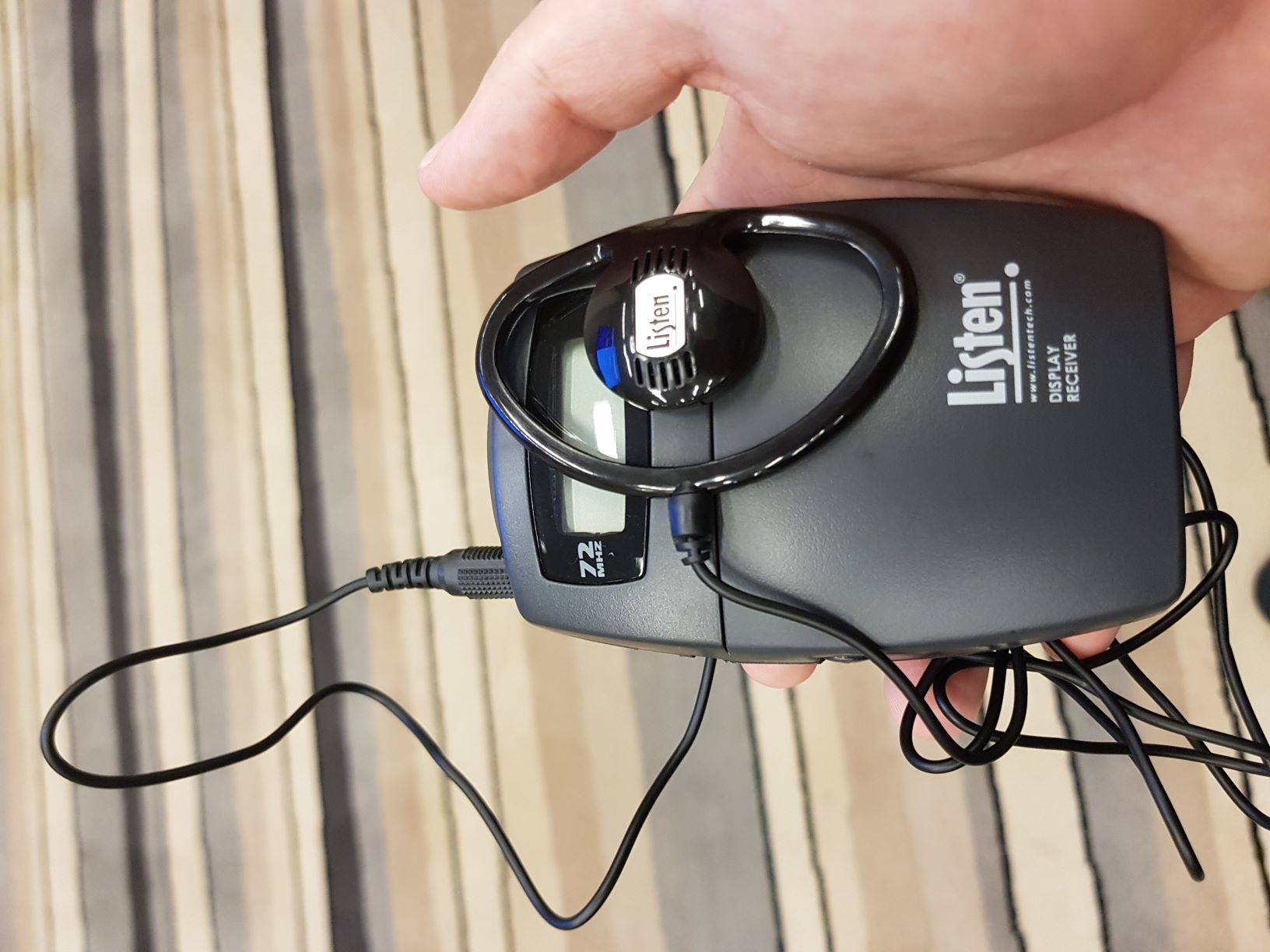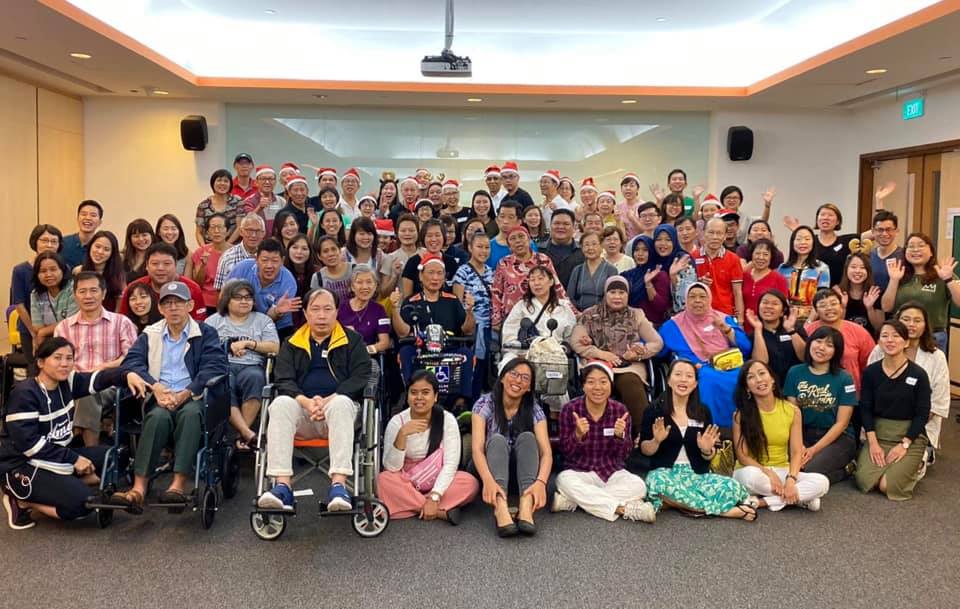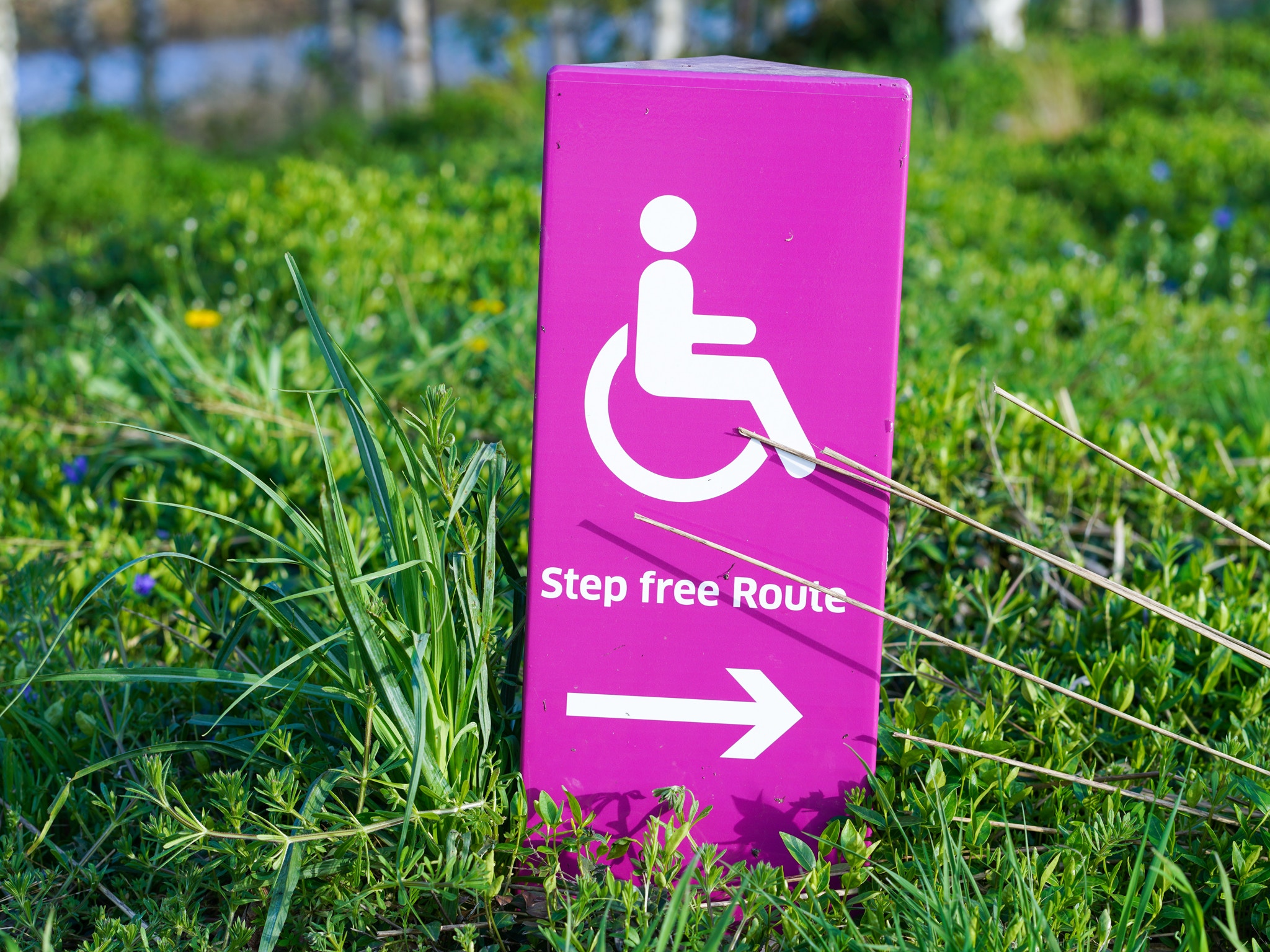Difference between revisions of "Disability"
| Line 164: | Line 164: | ||
===== Community Participation ===== | ===== Community Participation ===== | ||
| − | + | Click on [[Disability/Community Participation|Link]] | |
[[File:Yomex-owo-634531-unsplash.jpg|thumb]] | [[File:Yomex-owo-634531-unsplash.jpg|thumb]] | ||
===== Detection & Early Intervention ===== | ===== Detection & Early Intervention ===== | ||
| − | + | Click on [[Disability/Early Intervention|Link]] | |
===== Education ===== | ===== Education ===== | ||
| − | + | Click on [[Disability/Education|Link]] | |
===== Employment ===== | ===== Employment ===== | ||
| − | + | Click on [[Disability/Employment|Link]] | |
===== Family & Caregivers ===== | ===== Family & Caregivers ===== | ||
| − | + | Click on [[Disability/Caregiver Support|Link]] | |
===== Mobility & Access ===== | ===== Mobility & Access ===== | ||
| − | + | Click on [[Disability/Mobility and Access|Mobility & Access]] or for specific segments: | |
* [http://wiki.socialcollab.sg/index.php/Disability/Mobility_and_Access#Transportation Transportation] | * [http://wiki.socialcollab.sg/index.php/Disability/Mobility_and_Access#Transportation Transportation] | ||
* [http://wiki.socialcollab.sg/index.php/Disability/Mobility_and_Access#Access_to_Buildings Access to Buildings] | * [http://wiki.socialcollab.sg/index.php/Disability/Mobility_and_Access#Access_to_Buildings Access to Buildings] | ||
* [http://wiki.socialcollab.sg/index.php/Disability/Mobility_and_Access#Information_Access Information Access] | * [http://wiki.socialcollab.sg/index.php/Disability/Mobility_and_Access#Information_Access Information Access] | ||
| − | ==== Social Inclusion ==== | + | ===== Social Inclusion ===== |
| − | + | Click on [[Disability/Social Inclusion|Social Inclusion]] or for specific segments: | |
* [[Arts and Disability|Arts]] | * [[Arts and Disability|Arts]] | ||
* [[Disability Sports|Sports]] | * [[Disability Sports|Sports]] | ||
Revision as of 09:12, 6 April 2020
Contents
- 1 Overview
- 2 Definition of Disability
- 3 Key Statistics & Figures
- 4 Overview of Key Issues & Areas of Needs
- 5 Specific Sub-Pages
- 6 Resource Directory
- 6.1 Key Document Sources
- 6.2 Voluntary or Non-Profit Organisations
- 6.3 Special Education (SPED) Schools
- 6.4 Social Enterprises that provide services for people with disabilities
- 6.5 Social Enterprises or Businesses that hire people with disability
- 6.6 Disabled People's Organisations
- 6.7 Initiatives
- 6.8 Government Agencies
- 6.9 Scholarships and Bursaries
- 6.10 International
- 7 Disability Conferences
- 8 References
Overview
The information found in these pages have been populated by participants of the Disability Community Network and many other individuals who have an interest in Disability issues. Feel free to join the Network's Google Group / Forum if you are keen to touch base and contribute.
This overview provides a synopsis of the current knowledge base. Having considered all the information in the disability pages: 1) What are the priority issues that deserve attention, 2) What are opportunity areas that community or voluntary organisations can already take action on, and 3) What knowledge gaps deserve further investigation?

Last updated: 3 April 2020
Priority Issues
[These are candidate (not finalised) issues to be discussed and prioritised with participants of the DCN, after we share back the whole set of information.]
- Employment rates for PWDs are low, and there are little protections against discrimination.
- Sector has benefited from continuum planning across the life course through Enabling Masterplan (Early intervention, education, employment, caregiver support etc), so the new frontier will be community participation and social inclusion.
Actionable Opportunity Areas
[These are a list of ideas and actionable concepts that service providers, community partners and social innovators, can already take on and implement. For ideas that have not yet been fully articulated, see specific segments in each area of need]
- Inclusive Neighbourhoods (A community inclusion initiative for people with disabilities and their caregivers.The objective is to help community members, partners and local institutions integrate PWDs and their caregivers into the communal life of the residential neighbourhood, where PWDs are supported by the whole community but can also contribute back to it. This will be achieved through an strengths-based community development approach that maps and mobilises the assets of the community. Early stages of being conceptualised. Possible collaboration between AWWA, SGEnable & IPS. Interested to partner or support? Contact justin.lee@nus.edu.sg)
Knowledge Gaps
- [to insert key knowledge gaps]
- [to insert key knowledge gaps]
Definition of Disability
How Disability is defined in Singapore
Persons with disabilities refer to “those whose prospects of securing, retaining places and advancing in education and training institutions, employment and recreation as equal members of the community are substantially reduced as a result of physical, sensory, intellectual and developmental impairments.” Enabling Masterplan, MSF [Clarification: Will it be useful to specify what these mean by grouping different disabilities into these broader categories, eg physical (wheelchair users?) sensory (VI, HI), intellectual and developmental impairments (ASD, Dyslexia?)]
[Point to note: Lien Centre for Social Innovation adopts this definition in their recent publication titled People with Physical Disabilities in Singapore: Understanding Disabling Factors in Caregiving, Education, Employment and Finances.] [Clarification: May not need to include this point as Lien is likely taking reference from MSF and NCSS, so we only need to take into account those sources unless there are other good reasons to?]
There is no standard definition of disability which is accepted by all stakeholders. For example, NCSS/SSI lists a SSI course on mental illness under disability category, but in practice persons with chronic mental illness are not eligible for disability policies and programmes. This group is also not covered by Public Transport Concession Scheme for Persons with Disabilities, for which only those with "Physical Disability, Visual Impairment, Hearing Impairment, Autism Spectrum Disorder and Intellectual Disability" qualify.
How Disability is defined elsewhere
"But this differs from that of the United Nations Convention on the Rights of Persons with Disabilities, because those with mental health impairments - such as depression, schizophrenia and bipolar disorders - are left out. When asked about this, the MSF says not all mental illnesses result in disabilities, and with medication and treatment, patients are able to function well on their own." (ST 8 May 2016)
[Clarification: The main or only difference between SIngapore's official definition of disability and elsewhere is the inclusion of mental health conditions? ]
[Suggestion: Given that there may be disputes to what a useful definition is, possibly insert a link to a Discussion page on the implications of defining Disability differently. DPA has written about this somewhere previously?]
Key Statistics & Figures
These are key figures that are relevant for the disability sector at large; for specific stats such as employment rates, please see the respective pages. [Alternatively, we could also do this: cross-link to those statistics in the other pages; see example below]
Prevalence rate
Synopsis: Various sources put the prevalence rate at about 3% of the population, which means about 100,000 in total, out of which about 10,000 are students.
- SG Enable: No definitive data of the total number of people with disability exists, because no official central registry or comprehensive disability study has been done. According to 2013 data from SG Enable, Singapore has about 100,000 people with disabilities. In view of Singapore’s ageing population, this number will increase by 2030 as more people acquire a disability through the ageing process. [Citation for this?] According to Singapore’s population index, “the number of elderly citizens will triple to 900,000 by 2030.” Population.sg
- Straits Times: In Singapore, those with disabilities are estimated to make up 3 per cent of the population or well over 100,000 people.(ST 27 Sep 2016) [Clarification: Check what official source they are using for these figures, and if it is MSF or NCSS, can delete this]
- MSF - Enabling Masterplan: Some disability prevalence rates of Singapore citizens with disabilities are available from the Enabling Masterplan 2017-2021. According to the foreword of the Enabling Masterplan 2017-2021 , 2.1% of the student population have disabilities. (Source: Ministry of Education. This is based on the number of reported cases of students with sensory impairment, physical impairment, autism spectrum disorder and intellectual disability. The total student population is put at approximately 460,000). [This means about 9,660 students have special needs?]
- NCSS: Of the resident population aged 18 – 49 years, 3.4% have disabilities (Source: National Council of Social Service. Based on a random sampling of 2,000 Singapore residents and permanent residents aged 18 and above done by NCSS in 2015, the self-reported disability prevalence rate was 3.4% for those aged 18 – 49 years old. This includes those who acquired disabilities due to accidents and illness.) Of the resident population aged 50 years and above, 13.3% have disabilities (Source: National Council of Social Service. Based on a random sampling of 2,000 Singapore residents and permanent residents aged 18 and above done by NCSS in 2015, the self-reported disability prevalence rate was 13.3% for those aged 50 years and above. This includes those who acquired disabilities due to accidents, illness and older age).
Other relevant stats
- See employment rates of PWDs: 5 in 100 employed.
- [Insert link to other key stats; headline figure here]
- [Insert link to other key stats; headline figure here]
Overview of Key Issues & Areas of Needs
Click here for approach we took in this Landscape of Needs and Gaps exercise, and how to contribute.
Click the links below to go directly to specific areas of interest:
| Detection & Early Intervention | ↘ | |||||
| Education | ↘ | |||||
| Employment | ↘ | Social Inclusion
-Arts -Public Acceptance | ||||
| Community Participation | → | |||||
| Mobility & Access | ↗ | |||||
| Family & Caregivers | ↗ |
The following is also listed below in alphabetical order:
Community Participation
Click on Link
Detection & Early Intervention
Click on Link
Education
Click on Link
Employment
Click on Link
Family & Caregivers
Click on Link
Mobility & Access
Click on Mobility & Access or for specific segments:
Social Inclusion
Click on Social Inclusion or for specific segments:
Specific Sub-Pages
[To Update: Possibly, these specific disability types can be group according to the broader categories in the definition used by MSF: Physical, Sensory, Intellectual etc]
Physical Disability
Sensory Disability
Visual Impairment
Hearing Impairment
Intellectual Disability
Developmental Disability
Adults with Autism
[To Update: There should be a page on Autism in general instead of Adults with Autism]
Aphasia
Niche issues
Arts and Disability
Resource Directory
Key Document Sources
- 2018: Lien Foundation Study on Early Intervention Professionals
- 2017: NVPC Report on Issues Faced By People With Disabilities In Singapore
- 2017: Enabling Masterplan (2017-2021)
- 2016: Lien Foundation’s Inclusive Attitudes Survey of the General Public and Parents of Children with Special Needs
- 2016: DPA’s Achieving Inclusion in Education
- 2016: Singapore's Initial Report to the Committee on the Rights of Persons with Disabilities
- 2015: Lien Centre for Social Innovation's People with Physical Disabilities in Singapore: Understanding Disabling Factors in Caregiving, Education, Employment and Finances
- 2011: MOH's Caregiving in Singapore snippet of the National Health Survey 2010
Voluntary or Non-Profit Organisations
[To insert a synopsis: To give a sketch...How many SSAs in general that provide services across different type of disabilities; How many DPOs]
A good index of weblinks and resources for families with special needs kids in Singapore can be found here
https://en.wikipedia.org/wiki/List_of_disability_organisations_in_Singapore
Aphasia SG

Organised by a team of speech and language therapists, Aphasia SG is a 100% volunteer-run non-profit organisation whose flagship programme is Chit Chat Cafe, a free monthly “pop-up café” for persons with aphasia (PWA) and their caregivers to interact and enjoy a cup of coffee together in a safe space.
Its other flagship programme is the Aphasia SG Choir, which is conducted by music therapist volunteers and that has weekly evening rehearsals at a central location.
APSN
Down Syndrome Association (Singapore)
http://www.downsyndrome-singapore.org/
founded in 1995 by parents, has close to 1000 members, of which over 300 are persons with Down syndrome Operates a DSA Thriftshop at Telok Blangah Crescent
MINDS
Muscular Dystrophy Association of Singapore (MDAS)
SPD
Bizlink
http://www.bizlink.org.sg/ training and employment for people with disabilities One of Bizlink's biggest businesses is providing cleaning teams to other companies. These teams are made up of able-bodied workers and those with disabilities (ST 1 Oct 2017).
Special Education (SPED) Schools
19 SPED schools as of January 2018: https://www.moe.gov.sg/education/special-education/special-education-schools/list-of-sped-schools
Social Enterprises that provide services for people with disabilities
Olive Tree Development Centre
Social Enterprises or Businesses that hire people with disability
Crunchy Teeth
Started by parents of children with special needs - aims to provide baking skills to special needs children and youth, and retails baking goods
Dignity Kitchen
Personalised Love
https://www.personalisedlove.com/
SEOciety
Social Food Inc
https://www.facebook.com/pg/socialfoodinc/about/
Incorporated in 2013, Social Food Inc. Pte Ltd is an established Halal-certified food caterer that provide people with disabilities with employment training
Started by Sim Sin Sin. See Case Study of Social Food Inc
WISE Enterprise
https://www.wise-enterprise.sg/
Adrenalin
Six of the 25 workers at Adrenalin have disabilities and other special needs. Staff members include two deaf persons, an employee who uses a wheelchair and people recovering from mental illness (ST 1 Oct 2017).
Holiday Inn Singapore
Holiday Inn Singapore Orchard City Centre hotel in Cavenagh Road - 12 per cent of the more than 200 staff are PWDs, staff adjust to the different ways of communication of some PWD employees, some of whom have intellectual disabilities or autism (ST 1 Oct 2017). .
Han's Group
Han's Group, about 50 employees, or 10 per cent of its workforce, are persons with disabilities (ST 1 Oct 2017).
Foreword Coffee
https://www.forewordcoffee.com/
Trains individuals with special needs to be baristas and frontline service staff at its coffee outlets
Disabled People's Organisations
Disabled People's Association
Friends of the Disabled Society
Initiatives
NUS Makerthon organised by Computing, Engineering, Design & Environment.
Tikkun Olam Makers - Israel based maker movement that has done makerthons for disability sector in Singapore.
Government Agencies
MSF Disability Division
NCSS Disability Services
SGEnable
Owns the i'mable collective, which aims to showcase and market the creative works of persons with disabilities, giving them even more opportunities to hone their skills and sell their craft.
i'mable Collective aims to be the preferred first stop for organisations keen to support the purchase of high quality gifts with a social cause.
Scholarships and Bursaries
Dare to Dream
The scholarship provides special needs persons, who are successful in gaining entry into a diploma programme at the LaSalle College of the Arts, with funding of fees for the full duration of the diploma programme at the College. Dare To Dream
International
World institute on Disability https://wid.org/
Disability Conferences
| CONFERENCE | LOCATION | REMARKS |
| Having a Say Conference | Geelong, Australia | Organised by and for people with intellectual disabilities. While the programme isn’t jam packed with information, it’s definitely interesting to learn more about how people with ID raise issues of concerns, and really take part in setting the agenda. Seems fairly prominent within Australia, but not much international reach. Down Syndrome Association brought some of its advocates there last year to share their advocacy programme |
| Zero Project | Vienna, Austria | Packed chock-a-block with presentations, sharings, and booths. The theme changes year to year. 2018 was on Accessibility and saw representatives from a whole host of countries sharing more about accessibility (challenges of accessibility). Most interesting were the South American presentations that pretty much shared about how people took issues into their own hands and made spaces in their cities more accessible. The conference is accompanied by innovation booths that feature innovations from all over the world (e.g., a group of people in India who set up a form of landline service for people with disabilities to post and apply for jobs). Really cool stuff. 2019’s theme is on Political Participation. |
| Global Disability Summit | London, UK (2018) | Organised by International Disability Alliance. Seems to be the place to meet the who's who in the disability sector globally. |
| Inclusion International World Congress | Birmingham, UK (2018) | |
| Harkin Summit | Washington DC, USA (2018) | 2018 - Rather US-centric. But great information on employment and employability practices by large organisations. |
| ASEAN Disability Forums | Thailand (2019) | Moves around the ASEAN region depending on who the Chairman is. |
